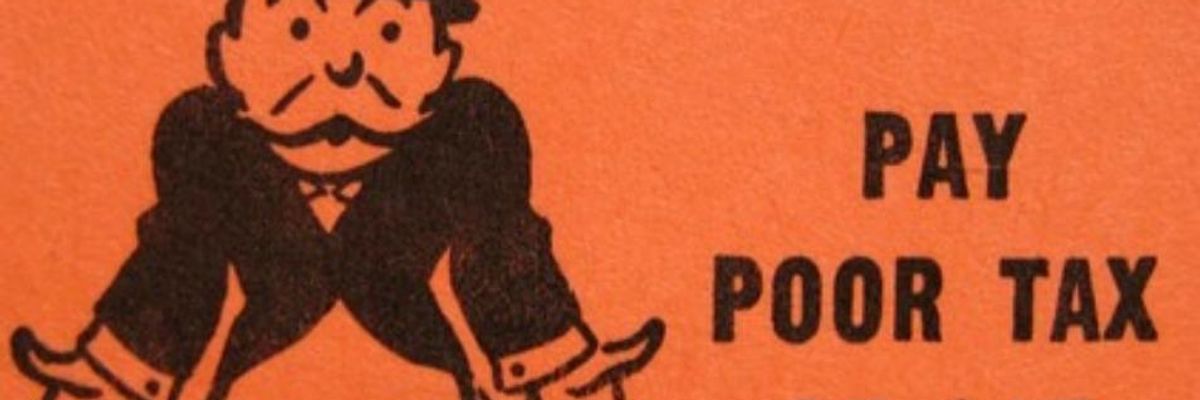The New York Times (4/17/15) has a post by Neil Irwin headlined "Why Americans Don't Want to Soak the Rich." Irwin suggests a couple of different answers to this question, depending on your ideological point of view:
If you're conservative, a compelling answer might be this: Americans are seeking less redistribution because they have come to their senses.... If you're a liberal, the answer might be more like this: Americans have been hoodwinked by conservative politicians and media outlets, and have come to view redistribution as a dirty word because they don't recognize the ways it benefits them.
I would suggest a third answer, though: American do want to "soak the rich."
There's something of a sleight-of-hand here, as Irwin asserts
that Americans' views on whether the government should work to redistribute income -- to tax the rich, for example, and funnel the proceeds to the poor and working class -- have, depending on which survey answers you look at, either been little changed, or shifted toward greater skepticism about redistribution.
He doesn't cite any examples of these surveys showing either little change or greater skepticism, but when I look at polling over time on taxing the wealthy, what's striking to me is how consistently popular it is. Gallup has asked 17 times since 1992 whether upper-income people pay too much, too little or their fair share of federal taxes, and every time a majority has said they pay too little. Only twice-in 2010 and 2011-have less than 60 percent said they thought the rich were not paying enough federal taxes.
The same series of Gallup polls found people saying that lower-income and middle-income people were paying either their fair share or too much in taxes. Corporations, like the wealthy, were seen as paying too little, by an even wider margin-only twice in 11 repetitions of the question did less than 66 percent say corporate taxes were not high enough.
And the Gallup results are no outlier. An AP/GfK poll from February (AP, 2/22/15) found 68 percent saying that wealthy households pay too little in federal taxes. Politifact (4/25/11) cited a handful of polls, with findings that range from 59 percent to 72 percent, in support of Paul Krugman's claim that "large majorities support higher, not lower, taxes on the wealthy."
And it's not just taxes on the wealthy; on the relatively rare occasions when they're asked to pick a side in the class conflict, the American people generally choose the left side of the field:
- "The income gap between wealthy Americans and those who are less well off": 51 percent called it "a major problem," while 15 percent said it was "not a problem" (ABC News/Washington Post, 1/12-15/15)
- "The economic system in this country unfairly favors powerful interests": 62 percent agree (Pew, 2/18/15)
- "Should the government do more to reduce the gap between the rich and the poor in this country?": 55 percent say yes (CBS News, 1/9-12/15)
- "The government should work to substantially reduce the income gap between the rich and the poor": 66 percent agree (CNN/ORC, 1/31-2/2/14)
- "Do you feel that the distribution of money and wealth in this country is fair, or do you feel that the money and wealth in this country should be more evenly distributed among more people?": 62 percent called for more redistribution (CBS News, 1/17-21/14)
- "How much, if anything, should the government do to reduce the gap between the rich and everyone else?": 69 percent said "a lot" or "some"; 26 percent said "not much" or "nothing at all" (Pew, 1/15-19/14)
So how does Irwin get away with claiming there is "flat or declining support for redistribution"? Part of it, as I said, is by not citing any actual polls; if he did, I suspect that even those that show "declining support" would still be indicating a high level of support, undermining the whole point of the column.
Another trick is to segue from (unnamed) polls to politicians' platforms-as if both are equally valid methods of gauging public opinion: "It's not just public opinion polls, either. It shows up in the actual policies espoused by candidates for office and enacted by Congress."
A more on-point topic for a column would be, "Why Politicians Don't Soak the Rich-Even Though Voters Want Them To." Clearly, the billions of dollars that flow to candidates from the wealthy are a major factor. But I wouldn't underestimate the role of hoodwinking by corporate media outlets-especially those owned by billionaires who have no desire to be soaked.
Take Action: You can send a message to the New York Times at letters@nytimes.com, or to public editor Margaret Sullivan at public@nytimes.com. Please remember that respectful communication is the most effective.

